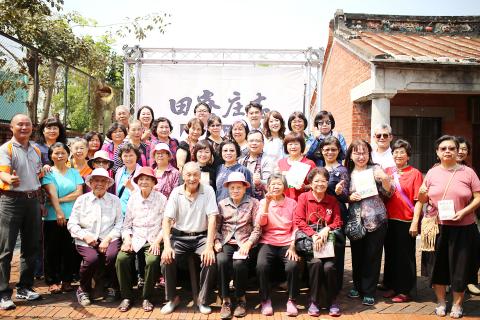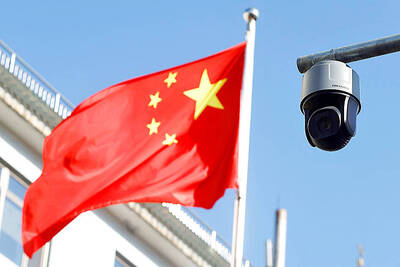Former Museum of Traditional Theater director Lai Yu-mei (賴玉梅) has made it a personal mission to help Hakka people in Pingtung rediscover their identity.
Lai said that decades ago, during the Japanese colonial era, a group of Hakka people from the Hsinchu-Miaoli area traveled south to Pingtung City, but over time the descendants of those migrants have forgotten their past and instead believe themselves to be native to Pingtung.
For two-and-a-half years, Lai, a third-generation descendant of those migrants, collected information, talked with elderly people in the region and pored over old maps to finish her book, titled Records of Tianliao (田寮庄志).

Photo: Chiu Chih-jou, Taipei Times
The Tianliao mentioned in the title is not Tianliao Township (田寮) in Kaohsiung, but refers to Fongtian Borough (豐田) in Pingtung, which used to be known as Tianliao.
Since retiring from Chaojhou Township Office’s Department of Culture and Tourism last year, Lai said that she felt that while she had helped many during her three decades as a civil servant, she had done almost nothing for her hometown.
While the residents in the area were mostly Hakka, the surrounding area was populated by people who mostly spoke Hoklo (commonly known as Taiwanese) or Minnan, causing much of the younger generation to be unaware that they are actually Hakka.
“I grew up in ‘Tianliao’ listening to the Hakka bayin [客家八音, Hakka music] played by elders,” Lai said, adding that she wanted others to learn about their origins as well.
Using her past contacts at the office, she was able to find government information and corroborate the data with oral accounts by elderly people.
Her work for the book was a race against time, a fact that hit her after she had arranged to interview two nonagenarians, but one passed away before she could visit them, Lai said.
Lai said she also attended the National Pingtung University of Science and Technology’s graduate institute for Hakka cultural industry to better learn how to deal with large amounts of data.
Her research also enabled her to find the local bak gong (伯公), a statue or shrine to the Minnan god of the earth, Lai said.
Hakka tend to use the temple, or the location of the bak gong to demarcate the boundaries of their villages, she said, adding that the bak gong also serves as a religious entity for local Hakka residents.

POLAM KOPITIAM CASE: Of the two people still in hospital, one has undergone a liver transplant and is improving, while the other is being evaluated for a liver transplant A fourth person has died from bongkrek acid poisoning linked to the Polam Kopitiam (寶林茶室) restaurant in Taipei’s Far Eastern Sogo Xinyi A13 Department Store, the Ministry of Health and Welfare said yesterday, as two other people remain seriously ill in hospital. The first death was reported on March 24. The man had been 39 years old and had eaten at the restaurant on March 22. As more cases of suspected food poisoning involving people who had eaten at the restaurant were reported by hospitals on March 26, the ministry and the Taipei Department of Health launched an investigation. The Food and

A fourth person has died in a food poisoning outbreak linked to the Xinyi (信義) branch of Malaysian restaurant chain Polam Kopitiam (寶林茶室) in Taipei, Deputy Minister of Health and Welfare Victor Wang (王必勝) said on Monday. It was the second fatality in three days, after another was announced on Saturday. The 40-year-old woman experienced multiple organ failure in the early hours on Monday, and the family decided not to undergo emergency resuscitation, Wang said. She initially showed signs of improvement after seeking medical treatment for nausea, vomiting and diarrhea, but her condition worsened due to an infection, he said. Two others who

The long-awaited Taichung aquarium is expected to open next year after more than a decade of development. The building in Cingshui District (清水) is to feature a large ocean aquarium on the first floor, coral display area on the second floor, a jellyfish tank and Dajia River (大甲溪) basin display on the third, a river estuary display and restaurant on the fourth, and a cafe and garden on the fifth. As it is near Wuci Fishing Port (梧棲漁港), many are expecting the opening of the aquarium to bring more tourism to the harbor. Speaking at the city council on Monday, Taichung City Councilor

Taiwanese should be mindful when visiting China, as Beijing in July is likely to tighten the implementation of policies on national security following the introduction of two regulations, a researcher said on Saturday. China on Friday unveiled the regulations governing the law enforcement and judicial activities of national security agencies. They would help crack down on “illegal” and “criminal” activities that Beijing considers to be endangering national security, according to reports by China’s state media. The definition of what constitutes a national security threat in China is vague, Taiwan Thinktank researcher Wu Se-chih (吳瑟致) said. The two procedural regulations are to provide Chinese